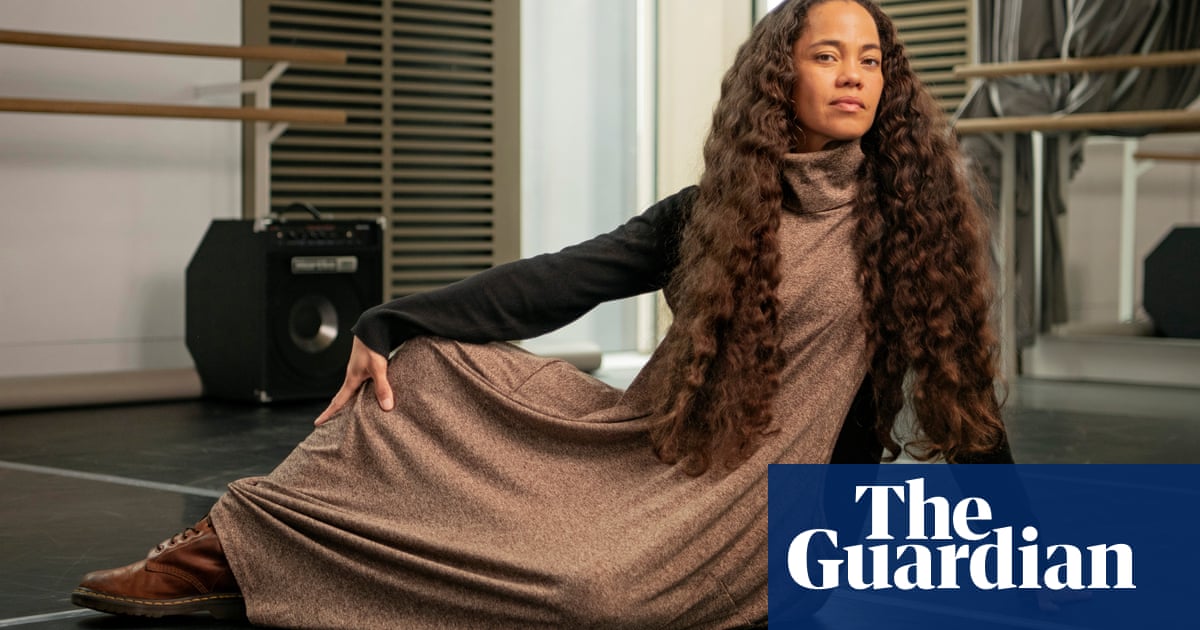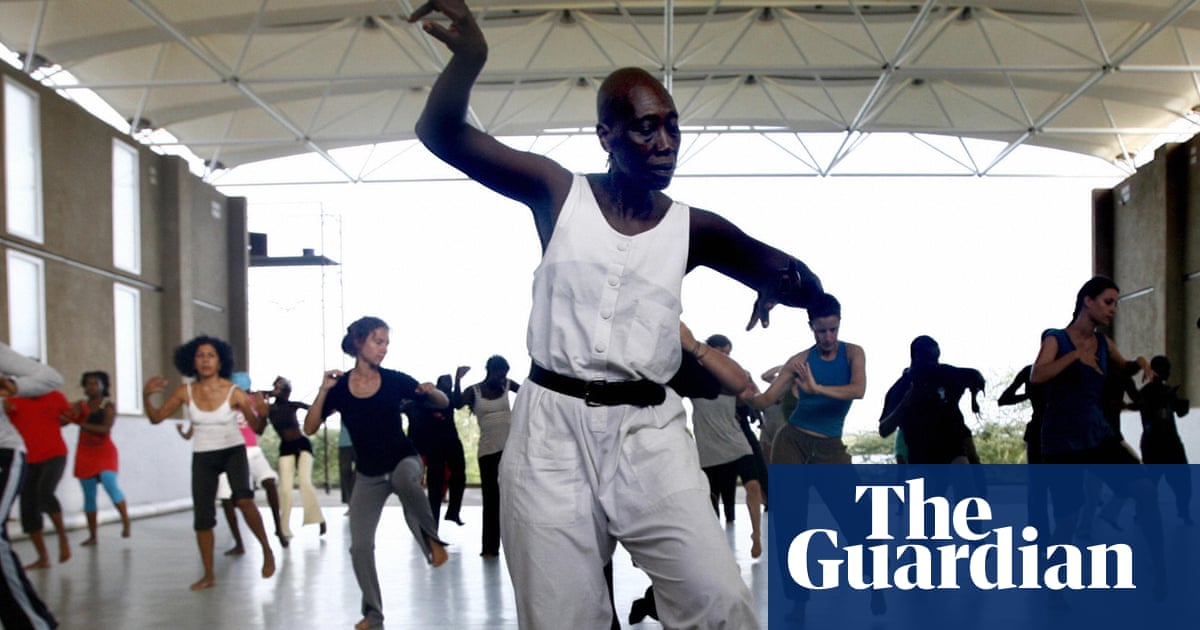
When the couples took to the dance floor in Kingston, Jamaica, they had their eyes on quite the prize: flights to England. But one contestant didn’t have a holiday in mind. Shelley Maxwell had secured a place for a master’s in choreography at London’s Trinity Laban conservatoire and couldn’t afford the travel. Here was her chance to waltz away for free.
“I kid you not – there was this ad in the paper,” she says. “British Airways ballroom dance competition … Yes please!” Maxwell enlisted a friend and, despite sparse ballroom experience, assembled an audacious routine. “We were watching videos on YouTube cos I was like: ‘I have to win.’ I loved being thrown, tossed, whatever – crazy swing stuff. And that’s how I flew to this country.”
Since leaving Trinity Laban in 2007, the consistently brilliant Kingstonian has become the go-to woman for creating compelling movement on stage. When we meet she has come from the Bush theatre in London, working with Lenny Henry on his one-man show August in England. In October, the musical of The Time Traveller’s Wife – which she choreographed to Dave Stewart and Joss Stone’s songs – hits the West End.
Maxwell is currently causing a buzz with her beautiful, spiritual and fiercely defiant moves for the Almeida musical The Secret Life of Bees, based on Sue Monk Kidd’s novel about a beekeeping Black sisterhood in the 1960s deep south. It’s a tale, as one character puts it, of “strength in numbers” and Maxwell’s core female ensemble arrive with twirling skirts, arms raised to the heavens, fans fluttering.
Maxwell’s choreography drew on rituals of South Carolina’s Gullah culture and various traditions of worship, including at Black churches where “there is huge permission given to the body to move in praise, so it’s bigger gestures, full-body swaying”. There is an essence, too, of Alvin Ailey American Dance Theater where she once took classes. Even an onstage cellist’s arms become part of her delicately spun sequences, which evoke honeyed romance, the way the southern heat leaves bodies languid, and the hope drawn from the 1964 Civil Rights Act. A revolving stage adds momentum to these women’s spirited march to register for voting.
“I like to stir emotions,” Maxwell says, whether through choreography or movement direction, which is a lesser-known art. Everyone appreciates the former, “from 5, 6, 7, 8 musical theatre and music videos”, but the latter is becoming better appreciated. In the past, “movement directors might come in for a session or consultation but wouldn’t be credited as part of that production”. She draws a parallel with fight direction. While actors may have been trained in movement or stage fighting, “a team of people with specialties can bring something more to it. Actors will know their physicality, their potential and limits movement-wise, and we can then work with them to pull out something more.”
Such as in James Graham’s Best of Enemies, set in the same era of US civil rights, charting the televised debates between William F Buckley Jr and Gore Vidal. As with Bees, her work explored “tension and what that does to bodies – and the antithesis of that, in freedom, marching and protests”. The opening set the tone, with a gradual thrum of activity among characters congregating, lost in discussions, capturing the zeitgeist. Maxwell then achieved a dynamic physical language to complement the seated battle of words.
Her contribution is a part of each production’s puzzle, she says. “Fling me in a space where I have to solve something!” Maxwell left a degree in actuarial science to pursue dance. But her expertise in risk assessment and probability analysis proved useful for “working out the jigsaw of sets, people moving, patterns and timings”.
With Ned Bennett’s astonishing revival of Peter Shaffer’s Equus, at Theatre Royal Stratford East in 2019, the puzzle was the play’s horses. They ditched the chestnut velvet tracksuits and equine masks that Shaffer advised, with Maxwell convinced “we can do it physically with people, without any paraphernalia”. A lengthy casting process with performers from a contemporary dance background brought them “the cast who could deliver what we wanted to do”. Eventually her rehearsals with Ira Mandela Siobhan – bare-chested as Nugget, the horse with which teenager Alan Strang is sexually fixated – “felt really like interacting with the animal”. Equus won her the 2019 Black British theatre award for best choreographer.
As a child in Kingston, dance was seen as a hobby, she says, not a profession. She would watch MGM musicals on TV and create routines for her brother and four cousins, with whom she grew up in her grandmother’s house. She became a contemporary dancer, studying in Cuba. “I love observing the way bodies are,” Maxwell says. “When I’m around new people, I just watch.” I squirm slightly and straighten my back.
Her research on the Bob Marley musical Get Up, Stand Up! took her back to Kingston “to ground myself”. The show was staged like a gig, requiring a stripped-back alternative to hyper-stylised West End musical choreography. “It’s a strong discipline to have a light touch,” she says. “Could you create something bigger, potentially more showy? Of course you can, always. Is it going to serve the story? Maybe not.”
To inspire her choreography for the actors playing Marley’s trio the I-Threes, Maxwell rewatched concert videos. Her research becomes obsessive: on Equus, “I found myself looking at horses everywhere. Choreographers create a lot in tiny spaces in their homes. There was a lot of me in my kitchen, bedroom and front room, trying to figure out what it is to move like a horse for a human.” Her young daughter contributes her own ideas. “She does every now and then say, ‘Mummy, put this step in your choreography.’” One move ended up in Maxwell’s routines for a pantomime.
In the rehearsal room, she wants “to make things joyful”. On the page, too, it turns out. She has written a pilot for a sitcom. “I’ve always danced, I’ve always written – they’re the two things that make me happy.” Maxwell breaks out the widest smile recounting her time choreographing a scene in The Marvels, coming to cinemas in November. “A massive sequence with beautiful movers – quite a different thing for a Marvel movie.” She just hoped it survived to the final cut. “In the trailer there’s half a second of it,” she reports. “I was like: ‘Yes, it’s made it!’”












